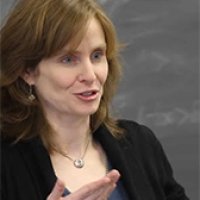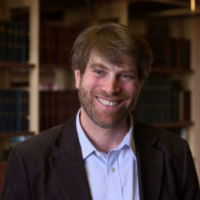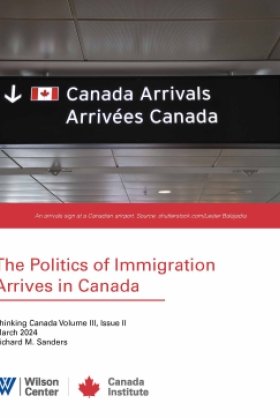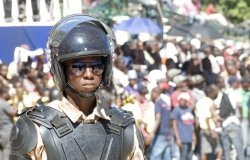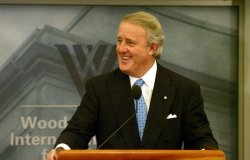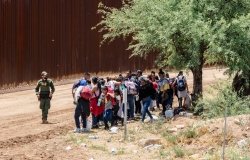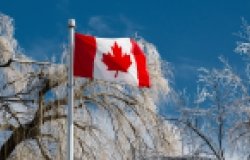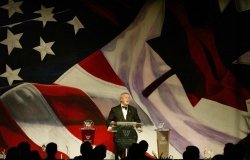New Book Discussion: <i> An Example for All the Land: Emancipation and the Struggle Over Equality in Washington, D.C.</i>
The District of Columbia holds a unique place in the history of this country's struggle for racial equality, according to author Kate Masur.
Overview
United States Studies Program
January 20, 2011
SPEAKERS:
Author: Kate Masur, Associate Professor of History, Northwestern University; commentators: Adam Rothman, Associate Professor of History, Georgetown University; Maurice Jackson, Associate Professor of History, Georgetown University; Jamin Raskin, Maryland State Senator and Professor of Law, American University Washington College of Law

The District of Columbia holds a unique place in the history of this country's struggle for racial equality, according to author Kate Masur. Although Washington was in many ways influenced by Southern culture, it frequently served as "a laboratory for experiments with democracy and racial equality." On January 20, 2011 United States Studies hosted a book discussion with Masur and a panel of other experts to talk about emancipation in the city and its implications for race relations in the rest of the country.
Masur explained that her project grew out of the idea that Washington was unique because it served as a site of "comingling of quintessentially northern and southern issues in this period." Demographically, Washington more closely resembled a southern city, with African Americans composing twenty to thirty percent of its population. However, northerners had unprecedented influence in local affairs after secession and the departure of southern politicians. Because of its unique status, many scholars question whether Washington can serve as a model in the wider study of urban history, but Masur argued that many of the issues facing D.C. were similar to those found elsewhere in the country during the period she studied—the Civil War and Reconstruction.
Prior to the war, Masur emphasized, the city's African American community was vital and diverse. The majority of Washington's black population was free, not enslaved, and it included many well-educated men and women who supported churches, private schools, and other community institutions. The city also attracted a significant number of escaped slaves as well as northern blacks who had an interest in the political opportunities offered by the capital.
This group's diversity became its strength as African Americans began to push for greater equality after the war. African Americans, Masur remarked, mobilized well in advance of policy changes. In "pushing for broader inclusion in the body politic and a broader vision of equality than most legislators," black activists were making what she calls "upstart claims." Among them were calls for equal access to the Capitol building and streetcars, as well as the right to vote and
hold public office.
Congress, led by Republican politicians, responded positively to many of these claims, with the result that in 1867, black men gained the franchise in the District. But just as quickly as these changes came about, they were undone, foreshadowing the legacy of Reconstruction throughout
the South. In the 1870s, Congress took away the District's home rule and replaced it with a commission appointed by the president. The city's rapid transition from being on the leading edge of equality to mass disenfranchisement is what made Washington "an example for all the
land."
Masur emphasized the struggle over equality as a new framework for the study of the Civil War. In writing the book, she said, she had chosen to examine competing visions of equality and inequality--"who favored which kinds of equality, in which places, and for what reasons." Placing equality in the context of status, Masur traced the arguments of the day on civil, political, and social equality. The definitions of civil rights that we take for granted were still being defined at that time, and opinions varied widely, especially on the topic of social equality.
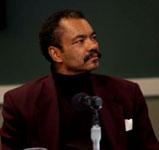
Commentator Maurice Jackson observed that the book poses challenging philosophical, political, and moral questions for African American historians. He connected the period of the Civil War and Reconstruction to his own work on the eighteenth century. During that time, early abolitionists and others struggled with concepts of freedom and humanity, asking, "Did freedom equate with being accepted as a member of human society?" Jackson highlighted the individuals and institutions that set the stage for the period of Reconstruction, including former slaves who had purchased their freedom and early leaders of black churches in the District. He also interpreted the service of black soldiers in the Civil War as a sign that African Americans wanted to fight for and earn their freedom, not be handed it.
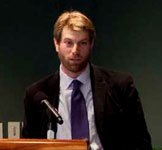
Adam Rothman commented that the book "uncovers a roiling world of political unrest and upheaval in the wake of emancipation, in the shadow of the Civil War, and then in the context of Reconstruction." For Rothman, the significance of Washington as the location of this history can be traced to its unique position as the "special representation of the nation." This raised the stakes in the equality debate as the city came under the increased scrutiny of the nation and the world. By being so close to the seat of power, African American leaders in the District were able to insert themselves into the political process in effective ways.
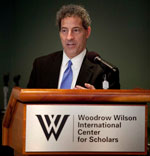
Jamin Raskin joined the discussion by calling Washington "a test tube for the state of American politics." In his view, the Reconstruction period set the template for future progressive movements in the city such as those that formed during the New Deal and the Civil Rights Movement. Raskin sees Washington as a paradox where local democracy is at its greatest when the nation as a whole moves toward greater federal power and intervention. He questioned whether in the future District residents will be able to reap the benefits of being the national political laboratory while at the same time achieving voting representation in Congress.
By: Andrew Bedell, Intern
Sonya Michel, Director, United States Studies
Documents & Downloads
- New Book Discussion: <i> An Example for All the Land: Emancipation and the Struggle Over Equality in Washington, D.C.</i>Download
- New Book Discussion: <i> An Example for All the Land: Emancipation and the Struggle Over Equality in Washington, D.C.</i>Download
- New Book Discussion: <i> An Example for All the Land: Emancipation and the Struggle Over Equality in Washington, D.C.</i>Download
Thank you for your interest in this event. Please send any feedback or questions to our Events staff.
